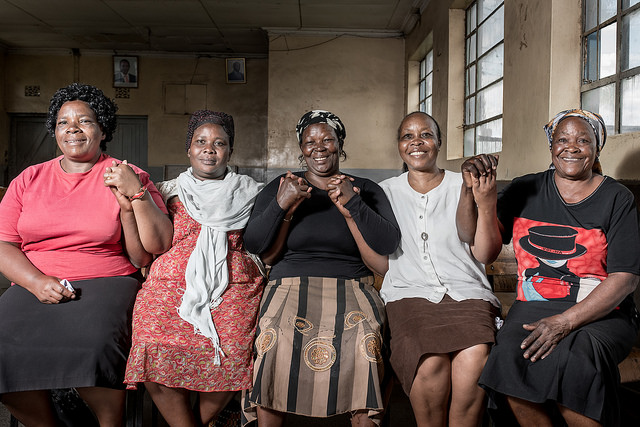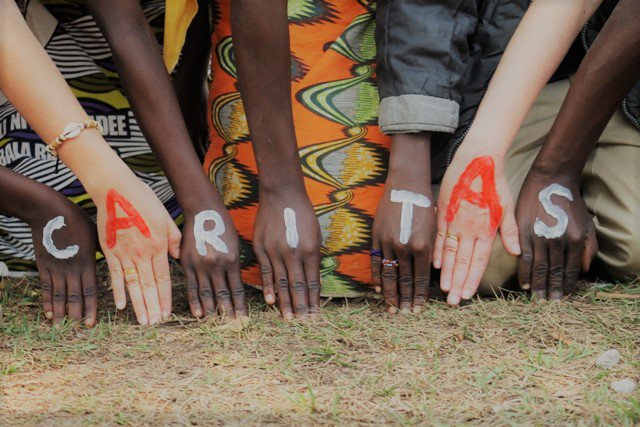“I thought I had no life. I thought this was the end. Because I was walking the streets.” – John
“I was absolutely destitute, dirty and down. I felt lost and trapped in this lifestyle.” – Louise
There are so many heart-breaking stories of poverty and despair. Pope Francis believes it’s time to listen to the voice of the poor and the marginalised and welcome them into the Church.
“The poor are not a problem,” the pope says. “They are a resource from which to draw as we strive to accept and practice in our lives the essence of the Gospel.”

Caritas Switzerland pond excavation and water treatment project in Ethiopia. Copyright: Joshua Smith/Caritas Switzerland
The pope is urging Catholic communities everywhere to reach out to those in need on the first-ever World Day of the Poor on November 19. This is a day where Catholics are asked to pray for those suffering from poverty, to reflect and to then take action.
“We are called, then, to draw near to the poor, to encounter them, to meet their gaze, to embrace them and to let them feel the warmth of love that breaks through their solitude,” he says.
Pope Francis announced his intention at the Year of Mercy in 2016 and the World Day of the Poor will be observed each year on the 33rd Sunday of the Church’s liturgical calendar.
“Let us love, not with words but with deeds” is the theme for the World Day of the Poor in 2017. Caritas Internationalis strongly encourages its members to deepen the pope’s critical message for the World Day of the Poor.
Michel Roy, Secretary General of Caritas Internationalis, said: “It is necessary for the poor to feel at home in our communities and ensure they receive all the attention, notably the spiritual attention, that they merit, because as Pope Francis recalls with pain, the worst discrimination that the poor suffer is precisely the lack of spiritual attention.”
On the inaugural World Day of the Poor the pope will celebrate a morning Mass with people in need and those who assist them. He will then offer lunch to 500 people at the Vatican.
Catholic dioceses and charities are being encouraged to reach out to soup kitchens, shelters, prisons, hospitals, nursing homes and treatment centres so that the words of the pope can reach everyone at the same time on this day.

Peacebuilding project in Kenya. Credit: Trocaire
Every parish is asked to organise at least one practical initiative, such as taking groceries to a needy family or offering a meal to the poor, purchasing equipment for the elderly or making a contribution to the Caritas fund for families.
The Pontifical Council for Promoting New Evangelization is coordinating the worldwide celebration and has issued a resource book — available online at www.pcpne.va. It includes scripture meditations, sample prayer services and other practical suggestions for parishes and dioceses.
From Venezuela to the Central African Republic, Catholic communities will gather on this day to pray together as they seek ways to support those less fortunate – the poor, the elderly, the unemployed, the homeless.
The pope has asked communities to create moments of encounter. Caritas in England and Wales has a list of simple suggestions that can make a difference from talking to a homeless person, making a donation or volunteering for as little as an hour a week. The smallest steps can change people’s lives.
“I fell in with some dangerous people and got hooked into prostitution as a way to make money. I got more into drugs and alcohol, committing various crimes to help support my habit. One day someone told me about a women’s centre called women@thewell and how I could get help. Now I feel like I have managed to get my act together. I have a studio flat and am starting to build bridges with my family. “ Louise – supported by women@thewell (http://www.watw.org.uk)
“I thought I had no life. I thought this was the end. Because I was walking the streets. Since 2010 I have been evicted from three different places and been in trouble with the police through anti-social behaviour. Cornerstone has been a big help. If it wasn’t for them I could have been found in a doorway, either dead or … I don’t know. They helped me get the place I have now. It’s the best thing since sliced bread. If you’re on the streets and you need help, come here and you’ll get sorted.” – John

Credit: Caritas
Catholic Relief Services, the international humanitarian agency of the Catholic community in the United States, says caring for the poor can be part of our daily routine. CRS says we can support low-income workers around the world by buying products or gifts that are produced and traded ethically.
“The vast majority of those who suffer in profound poverty do so through no fault of their own,” says Deacon Steve Swope, CRS Global Fellow Ambassador Educator from Atlanta.
“ They are often poor simply due to where they were born, and its associated lack of educational, vocational, and employment opportunities.”
The pope says we can all take action to change the course of history and promote real development and social justice.
“This new World Day, therefore, should become a powerful appeal to our consciences as believers, allowing us to grow in the conviction that sharing with the poor enables us to understand the deepest truth of the Gospel.”

